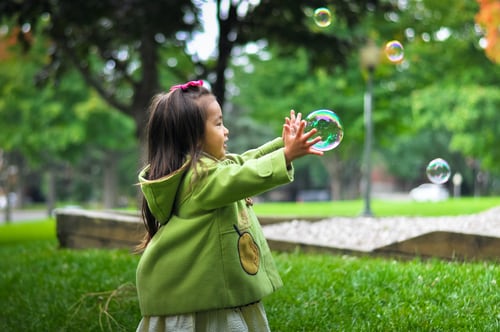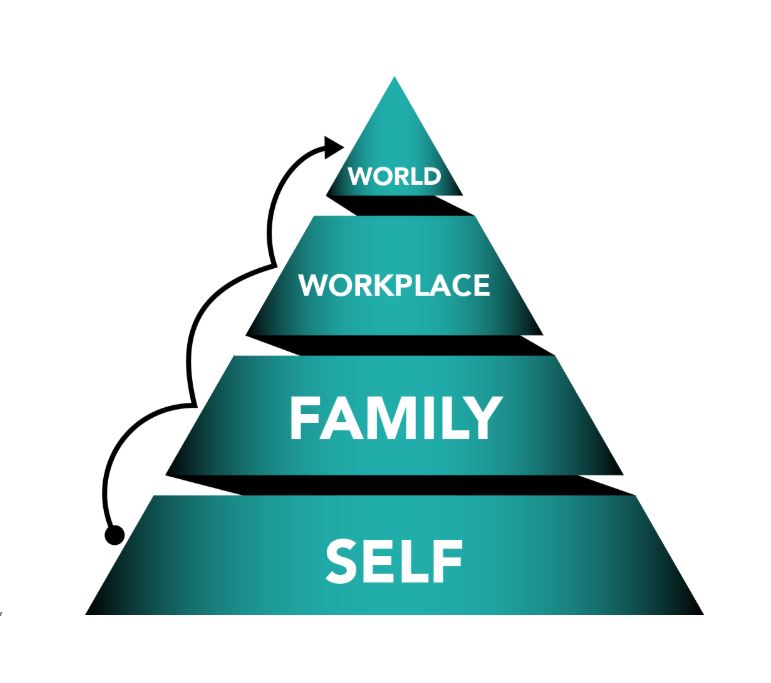Today’s BIG IDEA— “Your greatest contribution to the world as a leader may not be something you do, it might be someone you raise.” –Andy Stanley
When my first daughter was born, the nurses could tell we were total rookies in the parenting game, so they graciously provided us with a quick crash course in changing diapers, soothing, and feeding.
I don’t know what I thought it would be like, but I remember thinking—“Seriously, millions of people throughout history actually had children? This is crazy!”
And just when we started to feel like we were getting the hang of it two days later, they said, “Okay, you guys are ready to go home now” and they gently—but firmly—kicked us out of the hospital.
One of my first moments of panic came when I wrestled with the car seat like a complete amateur in the hospital parking lot, realizing that the safety of this precious little life had just been thrust completely into my care.
Most parents will tell you that you never feel prepared to be a parent—I certainly didn’t.
I felt unprepared and wanted to invest the time learning about effective parenting behaviors.
And although I am early in my parenting journey, my wife and I have found some incredible resources over the last few years that have helped us tremendously. I will share many of them with you today and hope they will help you as well.
If you want to lead well in all areas of your life, it is critically important that you develop a thoughtful strategy for leading your children.
Parenting is one of the most important factors for the future of our world
The strongest kind of leadership involves building a foundation of leading yourself well first, then leading your family, and then looking to impact the workplace and world.
When life bestows the blessing of another human into our care, it becomes one of the most important responsibilities we will ever have.
“Parenting is perhaps the only unique leadership role that I have, every other leadership job can be done by someone else.” –Andy Stanley
And after working in a maximum-security prison for 10 years of my life, I can honestly tell you that—for the vast majority—prisons are not filled with bad people. The majority of inmates are people who had very little support, negative social influences, and poor roles models.
Sadly, I recall when an inmate with a life sentence told me he had ten children. Therefore, the devastating effects of children without strong parents often continues across generations.
Especially in light of my time at the prison, I can’t help but believe that strong parenting is one of the most important factors for shaping the future of our world.
Take advantage of the great parenting wisdom and resources all around you
Many things in the world will fight to influence your children, but parents can still be the most powerful force.
In the modern world, some parents can take this too far by obsessing over trying to control every variable in their child’s life. I am not advocating this approach. This will only leave you exhausted and stressed out.
But I like what author and coach Daniel Harkavy says about it—“We cannot control everything that happens to our children, but we do want to stack the odds in our favor.”
I always have a hard time when people say, “Kids don’t come with an owner’s manual!” Because often these are the people that ignore all the wonderful resources that are available from research, and from the wisdom of parents who have gone before us.
Do you know some parents whose children are amazing? Take them to dinner and interview them! What do you have to lose?
Additionally, there are psychologists and educators who have been studying parenting behaviors and the effects on children for more than 70 years.
If parenting is one of the most important roles we will ever have in our lives, it’s literally crazy not to take advantage of the great resources so widely available today.
Here are five essential principles for parenting from great resources I’ve found:
- Love. Clearly, love should be the very first ingredient in parenting. Some famous historical studies at the turn of the century showed that the death rate for orphanages in the U.S. and U.K. was near 100% (Dr. Harry Bawkin). These studies concluded that a major contributor to the high mortality rate was lack of physical and emotional nurturing (i.e. love). National Geographic conducted a 14-year study on Romanian Orphanages that they published in 2013 which showed again that children needed families to thrive, and advocated for foster care as opposed to orphanages. Neuroscience research continues to suggest that ages 0-3 are critical formative years for the brain. The child’s brain at this age learns whether the world is safe, and if people can be trusted. Love provides this vital foundation.
- Time. It’s no secret—parenting requires time, and generally lots of it. My friends tried to tell me, but I didn’t really get it before I went through it for myself. And it’s hard to make up quality without quantity of time with your kids. People generally never regret scheduling big and consistent chunks of time to proactively influence their children’s lives. Alternatively, they almost always regret not doing it because you cannot get that time back. And what if your life was cut shorter than you thought it would be—would you wish you had devoted more time to influencing your children?
- Fun. Two of my favorite authors—Ray Johnston and Andy Stanley—pastors of some of the largest churches in North America, both emphasize fun as a vital element in effective parenting. They say it is the best way to ensure our kids will want to hang out with us after they leave home. Johnston also emphasizes—“If your life doesn’t look fun, they are unlikely to follow in your footsteps.” Schedule tons of incredible memories that are fun for your children, and make sure your life looks fun too.
- Discipline. Many parents have all the other things listed here, but do not have effective ways to handle discipline. Psychologists Henry Cloud and John Townsend argue that parents literally become boundaries in life for their children that their children ultimately internalize. In other words, they literally learn their own internal limit system by the boundaries we impose early in life. My wife also took a Love and Logic parenting class a few years ago that was truly life changing for us, and provided us some incredible tools for handling disciplinary situations without getting stressed out or angry all the time. (I have no financial relationship with Love and Logic Institute). Without it, we would have had a much harder time. Here are just a few key principles they teach: Self-esteem only develops through struggle so don’t over-help your children; showing anger mostly fuels the bad behavior you don’t want; don’t give warnings (or certainly not more than one) because real life often doesn’t work that way; and we need to let our kids learn from their mistakes as much as possible early in life when the consequences are less serious.
- Modeling. Leadership guru John Maxwell says, the first and most basic principle of leadership is that “people do what people see.” This is the concept to which this blog is dedicated. You cannot go wrong with a big emphasis on leading yourself well. Another great parenting adage to live by—More is caught than taught. Even in the early years, my kids are constantly surprising me by copying things my wife and I do. Seeing an example repeatedly is one of the most powerful and basic forms of human learning.
Have a great weekend!
Parker
*If you have enjoyed Parker’s blog, check out The Next Peak Podcast that Parker co-hosts. We interview successful leaders and discuss research-based principles that help people win in the workplace without compromising the things that matter most—relationships, a life of purpose, and health.
Suggested Resources
- Love and Logic by Fay and Kline (different books for different ages)
- Boundaries with Children by Cloud and Townsend
- Strong Fathers, Strong Daughters by Meg Meeker
- Becoming Babywise by Bucknam and Ezzo
- The Happiest Baby on the Block by Harvey Karp
- The Happiest Toddler on the Block by Harvey Karp




